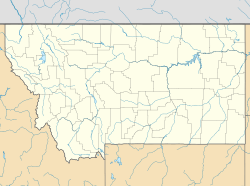Big Horn River Bridge facts for kids
Quick facts for kids |
|
|
Big Horn River Bridge
|
|
| Location | Milepost 2 on Montana Highway 104, Custer, Montana |
|---|---|
| NRHP reference No. | 09001188 |
| Added to NRHP | January 4, 2010 |
The Big Horn River Bridge is a special bridge located in Custer, Montana. It is listed on the National Register of Historic Places. This means it's an important historical site in the United States. The bridge was added to this list on January 4, 2010.
Contents
The Big Horn River Bridge
The Big Horn River Bridge is a very strong structure. It is known as a "riveted Pennsylvania through truss" bridge. This type of bridge uses many metal beams connected with rivets, which are like strong metal pins. The design helps the bridge carry heavy loads.
Building a Strong Bridge
Building this bridge took two years. Construction started in 1931 and finished in 1933. The bridge is quite long, stretching 624 feet across the river. It is also 21 feet wide, allowing vehicles to cross safely.
Dealing with Floods
The bridge is built in an area that has often flooded. This area is near where the Big Horn River flows into another river. Historically, the river would overflow its banks.
However, flooding has become less common since the Yellowtail Dam was built. This large dam was completed upstream in 1967. It helps control the river's water levels. Even with the dam, high waters have still happened. Notable floods occurred in 1978 and 2011.
A Famous Book Mention
The Big Horn River is even mentioned in a famous old book! The classic Western novel The Virginian was written by Owen Wister. It was published way back in 1902. In the book, there's a mention of a railroad bridge washing out near this area. It shows how powerful the river could be.
The book says:
- "This filling and repairing looks like the washout might have been true."
- "Washout? said Scipio.
- "Big Horn bridge, they say--four days ago."
- (chapter 16, p.204)
This shows that even over a hundred years ago, the Big Horn River was known for its strong currents and occasional floods.



